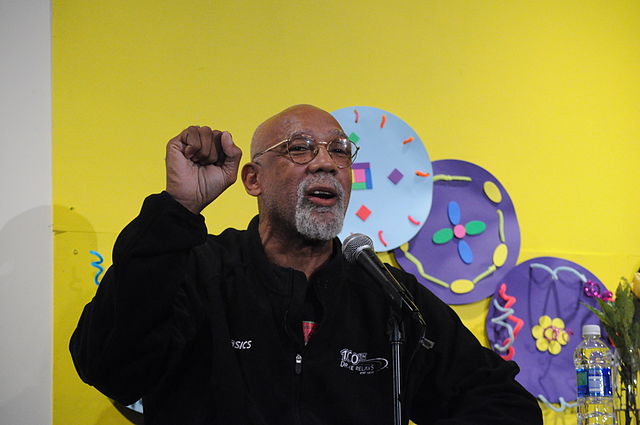John Carlos entered Olympic history at the 1968 Games in Mexico after he took part in the black power salute alongside Tommie Smith. He was disturbed by what was going on in the society and used his voice to highlight those issues. Carlos was a bronze medalist and afterwards, went into the National Football League (NFL) and the Canadian Football League before retirement. Here’s his full story.
People Also Read: Why Zambian Barbara Banda Is an Icon in Women’s Football
Become an insider. Subscribe to our newsletter for more top trending stories like this!
Get football equipment from Amazon.
John Carlos’ Early Life
John Carlos was a promising student in school. He participated in the 4 by 400m and helped his school, East Texas State University (ETSU), to get to the Lone Star Conference. He moved to San Jose State University where he worked with Llyod Winter.
People Also Read: Anthony Nesty: Inspiring History-Maker in US Olympics
Buy quality and affordable sports shoes on Amazon.
Professional Career
Carlos’ career was overshadowed by his 1968 protest alongside Tommie Smith. Before that, he won the 200m in the Olympic trials in a world record time, but his record wasn’t officially recognized. During the games, he crossed the finishing line in third place.
During the award ceremony, Carlos took a stance that changed the trajectory of his career forever. Before the games, he and Tommie Smith unsuccessfully called for a boycott of the game.
As a result, they silently protested during the award ceremony by raising their fists and only wearing black socks. The International Olympic Committee (IOC) judged his actions to be political and called for his suspension.
Initially, the U.S. Olympic team refused to cooperate with the IOC but later suspended him after they were threatened with a total ban.
Years after, Carlos explained why he took part in the black salute protest. Speaking to TMJ4.com, he said he wanted to make a statement. Additionally, his background was a huge motivating factor, as his parents are American immigrants from Cuba.
Join our Spotcovery Global Black Community Facebook Group for early access to exclusive content and to share in a lively discussion.
Athletics Record
John Carlos was a world-class sprinter. He equaled the 100-yard and led his university to the NCAA Championship with victories in 100 and 200-yard races.
Become an insider. Subscribe to our newsletter for more top trending stories like this!
In the 1967 Pan American Games, he clinched gold in the 200 meters and ran world bests in the indoor 60 and 200 yards dash.
People Also Read: 9 Remarkable Players in the All-Time Scoring List in the NBA
Buy running spikes on Amazon.
Change of Career
In 1970, John Carlos joined the NFL after the Philadelphia Eagles picked him as a 15th-round selection. However, he suffered a knee injury and never played in the league. He played for the Montreal Alouettes in the Canadian Football League for one year and then retired from sports.
People Also Read: 7 Best Football Colleges That Produce NFL Stars You Love
Awards & Recognition
For his impact on track & field, John Carlos was inducted into the Track & Field Hall of Fame.
He also received the Arthur Ashe Award for Courage and was the torchbearer for the Human Rights Torch.
John Carlos sacrificed his career for the greater good. He stood up to the injustices and called out different organizations, including the IOC, for a more equal and fair society. He still made an impact in his track & field career by breaking records. Today, he’s recognized as an iconic sports figure.
Nearly 80% of consumers visit directories with reviews to find a local business. List your business for free in our exclusive Spotcovery Black-Owned Business Directory.
Spotcovery offers unique and fresh daily content on Black culture, lifestyle, and experiences. We talk about everything black, black people, black-owned and black-owned businesses. We also deliver authentic and relevant content that will inform, inspire, and empower you! The future of black media is critical to today’s black experience! Our primary audience includes African Americans, Africans, Afro-Caribbean, and people of African heritage. Black culture is for the culture!
Become an insider. Subscribe to our newsletter for more top trending stories like this!





